Apache Commons Logging Version 1.2
Kaum zu glauben, aber von Apache Commons Logging gibt es noch einmal ein Update. Version 1.2 bietet als “maintenance release containing bug fixes” nichts neues, fixed aber laut https://www.apache.org/dist/commons/logging/RELEASE-NOTES.txt:
o LOGGING-37: Improve performance of LogFactory#getFactory() by calling
Thread#currentThread()#getContextClassLoader() directly instead
of using reflection. As a consequence support for JDK 1.1 has
been dropped. Thanks to Matthias Ernst, Archie Cobbs.
o LOGGING-156: Fix SecurityAllowedTestCase when executed with OpenJDK 1.7 due
to an additional required RuntimePermission. Thanks to Mikolaj Izdebski.
o LOGGING-157: Fix javadoc to comply with javadoc tool from jdk 1.8. Thanks to Ville Skyttä.
Aktuelle öffentliche Java-Seminare in Dortmund
- 18.08.-22.08.2014 (KW 34)
- 13.10.-17.10.2014 (KW 42)
- 06.10.-10.10.2014 (KW 41)
- 25.08.-29.08.2014 (KW 35)
- 20.10.-24.10.2014 (KW 43)
JDK 8u20 Early Access Release, JDK 8u20 build b22
https://jdk8.java.net/download.html, mit drei Änderungen eher ein kleines Release
Oracle’s Java-Support für Windows XP endet
Das von Microsoft ausgemusterte Windows XP erhält keine weitere Java-Unterstützung mehr.
Mehr darüber: http://www.zdnet.de/88197900/oracle-stellt-java-support-fuer-windows-xp-ein/
GMapsFX
Die GMapsFX-Bibliothek unter der Apache Lizenz bindet die Google Maps in eine Java-Applikation ein und bietet eine Java-API für Kartenelemente wie Pin oder Verbindungen. Java 8 ist Voraussetzung.
Gradle 2.0 freigegeben
Das auf Groovy basierende Build-Tool Gradle erklimmt eine neue Version: Gradle 2.0. http://www.gradle.org/docs/current/release-notes zählen auf:
Gradle 2.0 is an important milestone in the evolution of Gradle. As explained in the Gradle 2.0 announcement, the change in major version number signals a new backwards compatibility baseline. Many deprecated features and API have been removed in this release, allowing the development team to simplify the codebase and implement new functionality. The “Potential Breaking Changes” section of these release notes list all of the breaking changes that have been made and all Gradle users are strongly encouraged to read the list.
FindBugs 3.0
Ein neues großes Release mit Java 8 Unterstützung, siehe Ankündigung unter https://mailman.cs.umd.edu/pipermail/findbugs-discuss/2014-July/004029.html.
The primary changes are: FindBugs supports Java 8 now (both as runtime and target platform). We don't recognize all of the new Java 8 features, or detect many Java 8 specific bug patterns, but we can analyze Java 8 code without getting runtime exceptions. FindBugs requires minimum Java 7 as runtime environment! FindBugs uses ASM 5 now which means that some 3rd party detectors based on FindBugs 2.x/ASM 3 has to be upgraded. See details in ASM documentation. For people who need to run FindBugs using a Java 5 or 6 runtime, you should stick with the FindBugs 2.0 branch.
Weiter unter http://findbugs.sourceforge.net/.
asciidoctorj: asciidoc mit Java transformieren
http://asciidoctor.org/ ist laut Webseite “an open source Ruby processor for converting AsciiDoc markup into HTML 5, DocBook 4.5 and other formats”. Die Software ist in Ruby implementiert und so plattformunabhängig programmiert, dass auch eine Ausführung mit JRuby möglich ist. https://github.com/asciidoctor/asciidoctorj kapselt das in einem netten Projekt, sodass eine Konvertierung direkt mit einer Java-API möglich ist:
import static org.asciidoctor.Asciidoctor.Factory.create; import org.asciidoctor.Asciidoctor; ... Asciidoctor asciidoctor = create();...
String rendered = asciidoctor.render("*This* is it.", Collections.EMPTY_MAP); System.out.println(rendered);
...
String rendered = asciidoctor.renderFile(new File("target/test-classes/rendersample.asciidoc"), Collections.EMPTY_MAP);
System.out.println(rendered);
...
Mit Optionen:
Map<String, Object> attributes = new HashMap<>();
attributes.put("backend", "docbook");
Map<String, Object> options = new HashMap<>();
options.put("in_place", true);
options.put("attributes", attributes);
String render = asciidoctor.renderFile("target/test-classes/rendersample.asciidoc", options);
Project Jigsaw: Phase zwei
Eclipse 4.4 (Luna) ist da
http://eclipse.org/luna/, 76 Projekte werden koordiniert, eine stolze Leistung. Download unter http://eclipse.org/downloads/
Schön ist Code Recommenders, doof ist, dass das Google Plugin für GWT noch nicht unterstützt wird. Welches eurer geliebten Plugins wird noch nicht unterstützt?
Neue Runtime-Umgebung für Android – heise online
DataNucleus 4.0
Unter der Apache Lizenz:
It is the most standards-compliant Open Source Java persistence product in existence. It is fully compliant with the JDO1, JDO2, JDO2.1, JDO2.2, JDO3, JDO3.1, JPA1, JPA2, JPA2.1 Java standards. It also complies with the OGC Simple Feature Specification for persistence of geospatial Java types to RDBMS. It utilises an OSGi-based plugin mechanism meaning that it is extremely extensible.
http://www.datanucleus.org/. Neues: http://www.datanucleus.org/documentation/news/access_platform_4_0_0_release.html:
- Java 1.8 : Upgrade to ASM v5 to allow for Java 1.8 bytecode changes
- Java 1.8 : support for the majority of java.time types
- Changed the bytecode enhancement contract to use an internal definition rather than the JDO contract
- JPA : no longer needs to have jdo-api.jar present
- Cassandra : support for Cassandra 1.2+
- Support for multicolumn TypeConverters (used by RDBMS, Cassandra, Excel, ODF, Neo4j, MongoDB, JSON, HBase)
- SchemaTool : support for create/delete of a schema (where the datastore supports it)
- RDBMS : support for HikariCP and DBCP2 connection pools
- RDBMS : ability to use single connection per PM/EM (rather than 1 for transactional operations, and 1 for non-transactional operations)
- RDBMS : removed the need to create JavaTypeMapping classes when the user type has a TypeConverter
- JSON : support for embedded 1-1 relation fields/properties
- Excel/ODF/JSON/MongoDB/Neo4j/HBase/Cassandra : move to using „core“ definition of table/columns meaning access to generalised features tested on other datastores
Nach dem Pile of Poo kommt jetzt der Stinkefinger
In Unicode 7. Eine Auflistung etwa unter http://emojipedia.org/new-emoji/.
WildFly (JBoss AS) 8.1 freigegeben
https://lists.jboss.org/pipermail/wildfly-dev/2014-June/002207.html
Auch unser Kurs http://www.tutego.de/seminare/java-schulung/wildfly-8-administration-kurs-jboss-as.html berücksichtigt die kleinen Updates.
Spark: Sehr hübsches Java Micro-Web-Framework
http://www.sparkjava.com/. Traumhaft einfach:
import static spark.Spark.*;
public class HelloWorld {
public static void main(String[] args) {
get("/hello", (req, res) -> "Hello World");
}
}Wieder eine neue Sprache: Apple Swift
Na endlich kommt man für die iOS-Programmierung von Objective-C weg. Wirkt für mich wie eine Mischung aus Lua und JavaScript.
Einführung unter https://developer.apple.com/library/prerelease/ios/documentation/Swift/Conceptual/Swift_Programming_Language/. Viel Spaß ![]()
ControlsFX 8.0.6 mit einigen Updates
Die listet umfangreich http://fxexperience.com/2014/05/announcing-controlsfx-8-0-6/ auf. Neu sind etwa Dekoratoren zur Validierung:

JDK 7, Update 60 (JDK 7u60)
Siehe http://www.oracle.com/technetwork/java/javase/7u60-relnotes-2200106.html. Mal keine Security-Fixes nötig ![]()
Neu u.a.:
- This JDK release includes JavaFX version 2.2.60.
- This JDK release includes Java Mission Control(JMC) version 5.3. For more information, see JMC 5.3 Release Notes.
- http://www.oracle.com/technetwork/java/javase/2col/7u60-bugfixes-2202029.html

